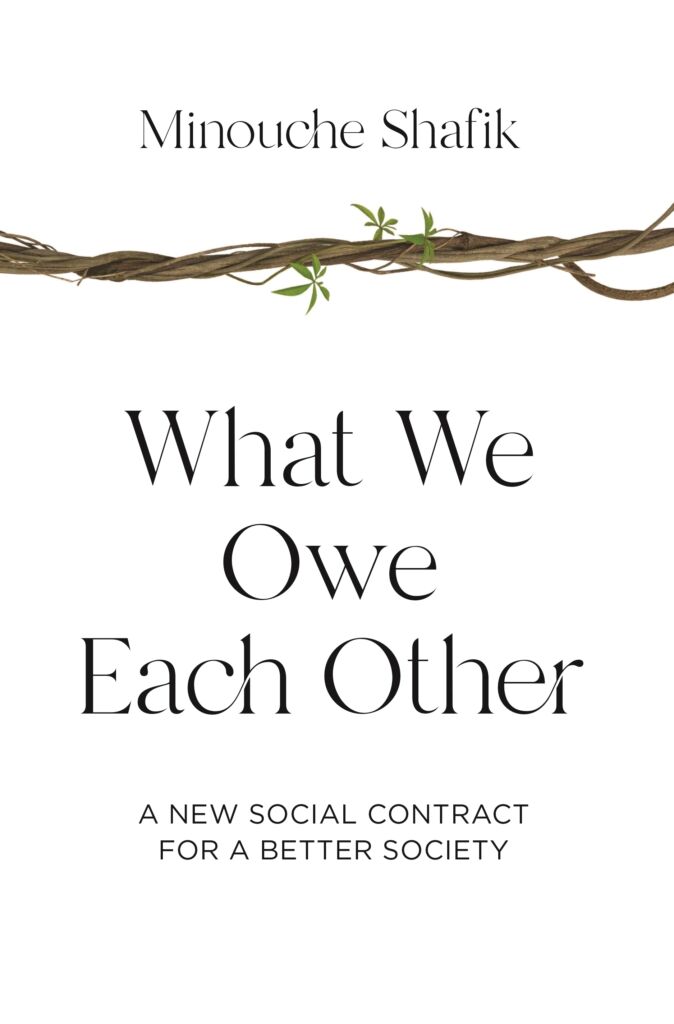Review: What We Owe Each Other by Minouche Shafik

Nobody has ever actually seen “the social contract” let alone signed it, which probably explains why there is so much disagreement about what is actually in it. In her new book, ‘What We Owe Each Other: A New Social Contract for a Better Society‘, economist Minouche Shafik sets out to explain what the social contract is, why it is broken, and what we can do to fix it.
The social contract, Shafik explains, dictates what “we” owe to “society” and what “society” owes to “us” in return. But who are “we,” “society,” and “us?” Shafik answers:
I like to think of mutual obligations as concentric circles. At the core, most of us feel the greatest obligation to our immediate family and friends…In the next ring of the circle is the community in which we live. This is often the domain of voluntary groups, religious associations, neighborhood and local government structures. In the next ring is the nation state…The final circle is the world, where the obligations are weaker…
The idea that we have greater obligations to our fellow countrymen and women (Shafik’s third circle, “the nation state”) than we do to people in distant lands, is not uncontroversial. In his book, The Big Questions, the economist Steven E. Landsburg responded to a critic of
mass immigration:
We care more about ourselves, our friends, and our neighbors than we do about strangers. But unlike me (and I hope unlike you) Goofus also cares more about strangers in the American city of San Antonio than about strangers in the Mexican city of Juarez. That strikes me as unappealing, just as if he cared more about strangers who happen to share his skin color.
Landsburg essentially removes Shafik’s third circle. In his argument, the resident of Minnesota should feel no greater obligation toward the resident of Louisiana than toward the resident of Lombardy: Nationality means nothing; we are all global citizens. The difference between Shafik’s and Landsburg’s attitudes here captures the essence of the current debate between “nationalists” and “globalists.”
If we accept that people owe obligations to each other under the terms of some “social contract,” the next question is how we should realize these obligations.
Too often, when people talk about “society,” what they really mean is the government. But that isn’t the only avenue through which we deliver on our obligations to each other. Shafik notes that “in every society, a huge amount of what falls within the bounds of the social contract continues to be provided by families.” “Every day we navigate mutual obligations and take care of others,” she continues, “not just within our families, but within communities and nation states, far in excess of narrow self-interest.” But her first example of this is:
Most obviously we pay taxes that will benefit people in other parts of the country…who we will never meet. We do this because we believe that living in a fair, well managed society helps us to live a better life and we are willing to contribute our share to achieving that for our own interest and because of solidarity with our fellow citizens.
We also do it because we will be put in jail if we don’t.
Shafik doesn’t completely avoid the trap of conflating society with the government and there are plenty of recommendations for more government spending. But there is also a realization that both taxation and government debt can reach unsustainable levels. Given how divorced from these realities much public policy debate is nowadays, this is refreshing.
There is good policy advice here. It is undeniable that we need “a system of education that is more flexible,” with lifelong learning allowing people to re-skill throughout their working lives.
Shafik also makes a strong case for early childhood intervention — “one of the most cost-effective ways of producing an educated labor force capable of acquiring new skills…[and] citizens who are less likely to require support from social assistance programs and or commit crimes…” True, this carries the taint of “It takes a village.” But progressives now push equality of outcome — disguised as “equity” — in place of equality of opportunity, and conservatives can fight this by reinvigorating equality of opportunity through early childhood interventions, provided that funding comes from existing spending. “Making early-years education a key element of the social contract, at least for the poorest families, makes both economic and social sense,” Shafik argues. Indeed, she argues that if the government focused more on this it could stop doing a lot of other stuff.
There is much to disagree with in this book, but it is an intelligent and honest attempt to tackle a broad range of problems. Besides, reading something you disagree with often generates the highest returns.
This review originally appeared in the Fall 2021 issue of Thinking Minnesota.